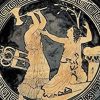The Persians
Part of a tetralogy that was first performed at the dramatic festival of 472 B.C. and won first prize, the choregus for this production was the famous Athenian statesman Pericles. The names of the other plays in the tetralogy are known, but they seem to bear no relation to the theme of The Persians, indicating that the dramatic trilogy was beginning to lose its organic quality even in the time of Aeschylus. The Persians is the only extant Greek tragedy on a contemporary subject, for it is an exaltation of the great Athenian naval victory over the Persians at Salamis in 480 B.C. The story is told from the Persian point of view, all the characters are non-Greek, and the setting is the exotic and remote royal court of Persia. Thus, despite its historical subject, the tragedy is detached from real life and has an almost mythological quality. The plot of The Persians reveals much adaptation and telescoping of historical events in order to illustrate clearly the moral theme that retribution comes to those mortals who are guilty of insolent pride and excessive prosperity.
The Seven Against Thebes
Part of a tetralogy based on the Theban cycle of legends that was first performed at the dramatic festival of 467 B.C. and won first prize. The other tragedies in the tetralogy were entitled Laius and Oedipus, the satyr-play was The Sphinx. The Seven Against Thebes tells the story of the civil war between Eteocles and Polyneices, the sons of Oedipus, after their father’s death. This same story is told in The Phoenissae of Euripides. Three plays by Sophocles, King Oedipus, Oedipus at Colonus, and Antigone, as well as other plays by Euripides, are based on incidents in the same cycle of legends, for it was one of the most popular in ancient times.
Prometheus Bound
First performed ca. 465 B.C., part of a trilogy that also included Prometheus the Fire-Bringer and Prometheus Unbound. This tragedy is based on the legend about the conflict between Zeus and the titan Prometheus, in the period just after the Olympian gods began to rule over the world. The entire trilogy probably explored such philosophical questions as the nature of god, the disharmony between the rule of force and the rule of reason, and the meaning of justice and order. These themes as treated by Aeschylus influenced many later writers, and the legend has become archetypal in western literature. The most famous work it has inspired is Prometheus Unbound by the English poet Shelley.
The Oresteia Trilogy (Agamemnon, The Choephori, The Eumenides)
First performed at the dramatic festival of 458 B.C., and won first prize. The satyr-play which completed the tetralogy was entitled Proteus. It dealt with the visit of Menelaus to Egypt on his way home from Troy after his ship was blown off course by the storm mentioned in Agamemnon. The Oresteia is the only complete trilogy that still survives.
Aeschylus is known to have written more than eighty plays. In addition to these seven tragedies, there are still in existence a few hundred fragments of other works, ranging in size up to several lines.

